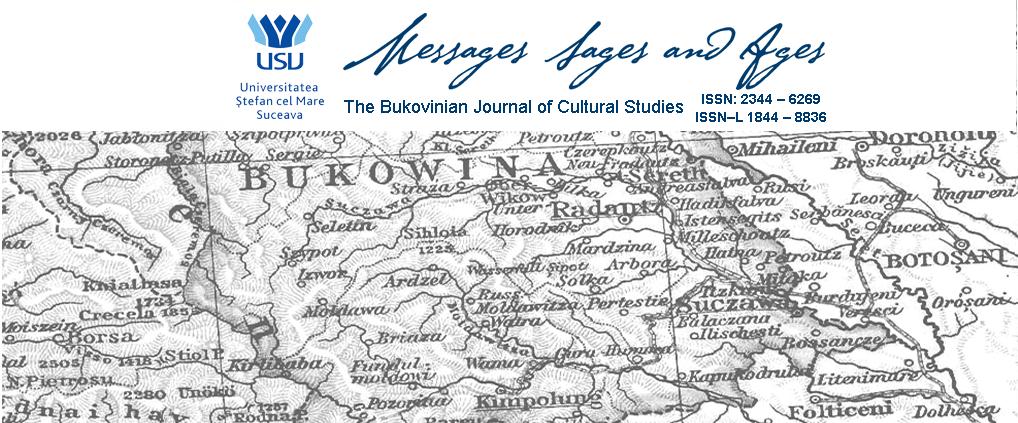The exploration of the multifarious ways in which cultural reworkings and translations have been involved in the transmission and circulation of various discourses, concepts and ideas in different historical periods and places, has become one of the most productive fields…
ETHNOCENTRIC TENDENCIES IN THE ROMANIAN TRANSLATIONS OF MACBETH
Starting from Venuti’s binary classification of translations into ethnocentric and foreignizing this paper focuses on the factors that trigger ethnocentric attitudes in the translation of the play Macbeth in Romanian. Counterbalancing the extremely neologist tendencies at the end of the…
REGIONAL IDENTIFICATION IN PRESENT DAY ROMANIA. THE CASE STUDY OF SUCEAVA COUNTY
In the aftermath of the 1989 Revolution, Romanian mainstream culture set out to reclaim the pre-Communist legacy of the country. The ‘golden age’ of interwar was the obvious choice; both popular and academic debates on Romanian identity looked back at…
REMEDIATING GLOBAL MEDIA IN RECENT SHAKESPEARE PRODUCTIONS ON ROMANIAN STAGES
The paper discusses recent Romanian Shakespeare productions of The Tempest and A Midsummer Night’s Dream in Bucharest. It argues that global mass culture, in the form of TV sitcoms and musicals, YouTube clips and computer games, is re-circulated on Romanian…
Messages, Sages, and Ages, Vol. 2, No. 2, (2015)
Editor: Onoriu Colacel
AN ETYMOLOGICAL PROPOSITION: OLD GERMANIC GOD-SPOD GOOD FORTUNE AS SOURCE OF OLD CHURCH SLAVONIC GOSPOD LORD, MASTER
A thorough checking of the data provided by three etymological dictionaries, namely Georgiev et al. 1971 (s.v. gospod), Vasmer 1986 (s.v. gospod) and Derksen 2008 (s.v. *gospod), would be enough to raise serious doubts about the application of the label…
THE PROBABLE OLD GERMANIC ORIGIN OF ROMANIAN iele (evil) fairies
Iele (or ielele, with a definite article) is the name of the “evil fairies” (zânele rele) of the Romanian mythology. They are mentioned in old Romanian folktales and legends and they have been a constant source of inspiration for many…
SUCEAVA ON CAMERA: THE COUNTY COUNCIL AND LOCAL SELF-IDENTIFICATION IN 21ST CENTURY ROMANIA
In post-communist Romania, regional self-identification has undergone significant change. Particularly, a paradigm shift occurred in relation to 20th century Romanian historiography (I have in mind the national communist as well as inter-war historic narratives). The literature and the promotional films…
VEILED TRUTH IN ENDURING LOVE AND ATONEMENT
The article tries to demonstrate that Ian McEwan’s novels, Enduring Love and Atonement, are similarly concerned with the way in which fiction writing is more apt to veil “truth” than to unveil it, also to invite partial readings of “reality”…
CANON, CLASSICS, TRADITION: DEMARCATION OF THE TERMS
The canon is a concept with a long history. The religious canon was eventually re-established on secular grounds, where it was comprehended in the categories of official literary (general) and personal (individual) canons, educational canon (reading lists) being correlated to…
A PERSON NOT IN THE STORY: CLERAMBAULT S AND M. R. JAMES S TEXTILE/TEXTUAL FOLDS
Though unrelated when it comes to their scientific occupations, Clérambault and M. R. James give to the 21st-century observer the impression that they were strikingly similar in their compulsive preoccupation with draped bodies or with what Gilles Deleuze names “the…
POST-TOURISM AND THE MOTIF OF REGRESSION IN JULIAN BARNES S ENGLAND, ENGLAND
The present paper starts from the assumptions and concepts of Zygmunt Bauman, George Ritzer and Jean Baudrillard concerning the regressive nature of the act of consumption and its “conceded freedoms” (Baudrillard), which infantilize the consumer and ensure high social integration…
THE EXISTENTIAL DEMOCRACY AND ITS PUBLIC INTELLECTUAL The Surprising and Unsettling Challenges Arising from our Inter-connected Information Society
This paper is constructed as an elaborate answer to the question “what is and what should be a public intellectual today?” Using a range of critical theorists I argue that the function of a public intellectual is connected to specific…
THE AESTHETIC INDIVIDUAL AND THE NEW SOUTH IN THE AGE OF ALIENATION IN WALKER PERCY’S “THE MOVIEGOER”
This paper addresses Walker Percy’s first novel, The Moviegoer, tracing the use of existentialist tropes in its narrative construction in order to delineate the problematic condition of the human individual in the postwar South. The protagonist’s search for an authentic…
